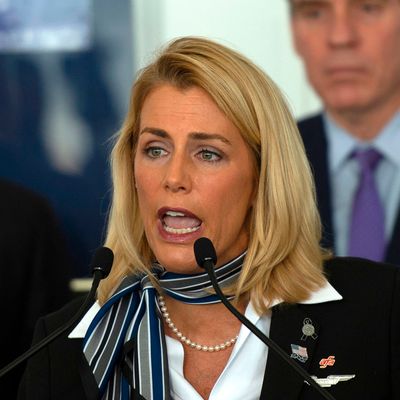
On Friday morning, air traffic controllers missed their second paycheck due to the government shutdown. Many called out sick, resulting in delayed flights at some of the nation’s busiest airports, including LaGuardia, Newark, and Hartfield-Jackson in Atlanta. Now, flight attendants may also walk out. Sara Nelson, president of the Association of Flight Attendants-CWA, told New York on Friday afternoon that she “just finished” recording a video message to members urging them to get to the offices of their congressional representatives until the shutdown is resolved.
“We’re mobilizing immediately,” Nelson said. Asked if this meant that flight attendants will not be going to work, she responded, “Showing up to work for what? If air traffic controllers can’t do their jobs, we can’t do ours.”
Nelson had previously raised the possibility of a general strike on Sunday, in protest of the government shutdown. Speaking to New York, she emphasized that the shutdown has created safety risks for her members. “If air traffic controllers are distressed and worried, that is a direct impact on our members,” she said. “When TSA agents are sleeping in their cars, worried that they can’t pay their bills, that impacts us.”
“These are the very people who keep our aviation system safe. And these are the very people our government has betrayed,” she concluded.
In a tweet on Friday afternoon, Nelson defended the right to strike:
Rebecca Givan, an associate professor of labor studies and employment relations at the University of Rutgers, told New York that she believes Nelson is defending “the moral right to strike.” The legalities of a flight attendant strike are murky, but Givan says that AFA-CWA has stayed well within the boundaries of the law. “They have the right to use sick days,” Givan explained, even if they’re taking more sick days than usual. She added that flight attendants “have leeway” regarding safety concerns. Most flight attendant contracts contain clauses that actually requires them to publicly identify safety concerns that could impact themselves and passengers – which is precisely what Nelson and her members have done. The International Labor Organization, which is a specialized agency of the United Nations, further recognizes the right to refuse unsafe work.






























